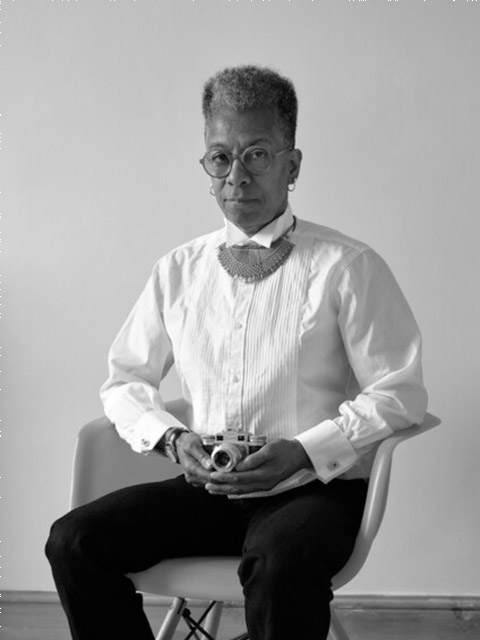In 2017, Autograph displayed Making Jamaica: Photography from the 1890s exploring how a new image of Jamaica was created through photography in the late nineteenth century, featuring historical photographs, lantern slides and stereocards revealing the carefully constructed representation of this transitional period in Jamaica’s history. As part of the exhibition, we invited artist Ingrid Pollard to apply her signature hand-tinting technique to five large-scale modern prints created from scans of the original postcards by Valentine & Sons. The works - titled The Valentine Days - were first displayed alongside the archival images in Making Jamaica, and together with a sixth work produced during her Light Work artist residency in 2018, are now part of Autograph's collection of photography.
Pollard's commission marked the 30th anniversary of her seminal series Pastoral Interludes, a series of five hand-tinted photographs that depict solitary black figures in the rural English countryside, juxtaposing landscape, portraiture and text.
Pollard defines her own work as ‘a social practice concerned with representation, history and landscape with reference to race, difference and the materiality of lens-based media’, often questioning social constructs such as Britishness, or the notion of home and belonging. Steeped in an ambiguous heritage of Wordsworth and the Romantic Poets, her photographic practice has explored the beauty of the English landscape and coastline, alongside the memories hidden within Britain's history and its relationship to Africa and the Caribbean. Her interest in the layers of history is echoed in the accomplished use of 19th century photographic techniques.
Pollard said of the process creating The Valentine Days commission: "Looking at the images for many hours as I tinted them by hand, I felt caught in the aura of the photographs and identified with the people in them. The process of tinting brings a type of life to the images. I especially enjoyed inspecting the image for what I call the 'escapees', the mysterious faces looking out of the window, those positioned just on the edge of the frame slightly out of focus, the tiny figures in the distance looking back at the photographer, taking part in the moment in their own way. It reminded me of what scholar Laura Marks wrote about loving disappearing images, how one must 'trust that the image is real in the first place to establish a link between the long ago object and the present day spectator'. The intricate, meditative work involved in the technique of tinting forms a historic link to my own earlier tinted works, bringing me closer to them."

is a Guyanese-born British artist whose social practice is concerned with our relationship with nature and complex constructs of Britishness, identity, race, and representation. She lives and works in Northumberland. Working interdisciplinary across a variety of techniques from photography, printmaking, drawing and installation to artist books, video, and audio, Pollard’s practice combines rigorous research and experimental techniques that include digital and analogue image-making processes.
In 2022, Pollard was nominated for the Turner Prize for her major survey touring exhibition Carbon Slowly Turning, first presented at MK Gallery in Milton Keynes, which explores her pioneering practice from the 1980s to the present day. She is an Honorary Fellow of the Royal Photographic Society and was a recipient of the Leverhulme Fellowship Award in 2007, the BALTIC Artist Award in 2018, and the Paul Hamlyn Foundation Awards for Artists in 2020. Pollard received her doctorate-by-publication from the University of Westminster in 2016.
Pollard was actively involved in the Black British art movement in Britain and has participated in numerous seminal group exhibitions since the 1980s – such as The Thin Black Line at the Institute of Contemporary Arts, London (1985), D-Max (1987) and Self-Evident (1995), both at Ikon Gallery, Birmingham – and has exhibited internationally for more nearly five decades, including at the National Portrait Gallery, Museum of Modern Art (Oxford), NGBK (Berlin), Camerawork (San Francisco) and the National Gallery of Jamaica. Her work is represented in prestigious public collections including the Victoria & Albert Museum, Tate Britain, and Arts Council England.

Banner Image: Ingrid Pollard, The Valentine Days [detail], commissioned by Autograph.
Images on page: 1-5) Ingrid Pollard, The Valentine Days, commissioned by Autograph, 2017. 6) The making of The Valentine Days in the studio. 7) The Valentine Days on display as part of the exhibition Ingrid Pollard: Carbon Slowly Turning at MK Gallery, 12 March - 29 May 2022. Photograph by Rob Harris.
Autograph is a space to see things differently. Since 1988, we have championed photography that explores issues of race, identity, representation, human rights and social justice, sharing how photographs reflect lived experiences and shape our understanding of ourselves and others.